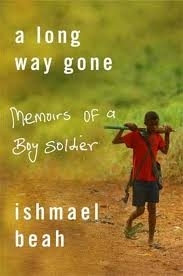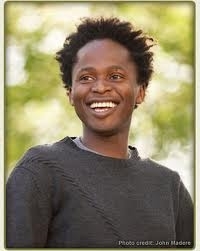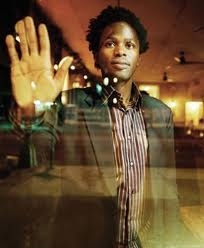 |
| Ishmael Beah's Memoir (http://www.vision.org/visionmedia/article.aspx?id=3234) |
Think back to life as a twelve year old. Most likely, the thoughts that may have come to mind were not similar to those of Ishmael Beah. The thoughts that plagued Ishmael Beah's childhood were war, death, and fear. Ishmael Beah was born February 23, 1980 in Sierra Leone. A civil war raged during Beah’s childhood in Sierra Leone between rebels (RUF) and the government, eventually killing his family in 1991. Beah was left to flee and wander all over the small country for several months with other children, his age and younger. He was eventually forced to join the government army. He was exposed to drugs, alcohol, and death almost every day as a soldier. He was eventually rehabilitated in 1996, but the task was not easy, physically or mentally. In 1996, he spoke about what he had gone through, what he had to do, and what other people's fates were. In 2007, he published a book, A Long Way Gone: Memoirs of a Child Soldier, which captured his early life experiences with great detail. The book tells the story of his life on the run, how he became a child soldier, and how he was rehabilitated and returned to a normal life. He currently resides in Brooklyn, New York. The actual story and journey of how he survived before he was captured was nothing short of a miracle. During his journey, he lived everyday not knowing if he would be there to see the next sunrise. However, in every passing day he displayed phenomenal courage and determination, proving Ishmael Beah is one of the most dramatic heroes of our modern time.
On his journey, Beah was frequently forced to deal with making life or death decisions. Through all his decision making, he always displayed courage. His story and life on the run brought many obstacles and dangerous situations, but he stood up to fear many times. "One of the unsettling things about my journey, mentally, physically, and emotionally, was that I wasn't sure when or where it was going to end." (Beah, A Long Way Gone 69). As a child, choosing to leave the only remaining things in his life must have been difficult. He wasn't even a teenager, yet he built up the courage to keep going to avoid sharing the same fate his family had suffered. He was eventually forced to join the army, a decision he made in order to live. "After almost a year of running, I, along with some friends I met along the way, arrived at an army base in the southeastern region. We thought we were now safe; little did we know what lay ahead." (Beah, The Making, and Unmaking, of a Child Soldier 1). Not knowing what was ahead of him, he and a group of children kept going, hoping to survive and make it to the next day. Even when they were in the "safety" of the government soldiers, they were brutally treated and made to do things similar to those if they were captured by the rebels. They were child soldiers whether they were with the rebels or government. Face to face with danger, Ishmael Beah never stopped displaying courage well beyond his maturity.
 |
| Ishmael Beah In 2007 (http://www.alongwaygone.com/ishmael_beah.html) |
Alongside courage, throughout his journey, Beah also displayed a tremendous amount of determination. He was determined to survive and seek a better life in the future. "When I was very little, my father used to say, "If you are alive, there is hope for a better day and something good to happen. If there is nothing good left in the destiny of a person, he or she will die." I thought about these words during my journey, and they kept me moving even when I didn't know where I was going. Those words became the vehicle that drove my spirit forward and made it stay alive." (Beah, A Long Way Gone 54). As Beah indicated, living on the run from danger, violence, and death, was not elementary. However, he took reality and hope of a future and turned his father’s words into a personal goal; not give up and do whatever it takes to survive. "Surviving each passing minute was nothing short of a miracle." (Beah, The Making, and Unmaking, of a Child Soldier 1). The fact that he survived every day, let alone several days, while the RUF were fighting throughout his country, was a miracle in and of itself. Beah's will to live and hope for a better future was a major factor in why he was able to survive. Maintaining the determination to follow through with one’s goals can be difficult, and Beah was one of the few that lived to see his determination pay off.
Throughout his journey, Ishmael Beah demonstrated an outstanding amount of courage and determination. He lived against all odds. With this well earned miracle of a second lease on life, he made others aware of what he went through to try and prevent others from the same fate. Since he moved to New York in 1998, he has been involved with UNICEF and other organizations to help raise awareness and support to see an end of children soldiers. Beah's story of courage and determination should make people realize not to take family and freedom for granted. He and his story both inspire people to make the most of the freedom that their lives allow and to never give up or quit. When faced with an obstacle in our day to day lives that seems overly frustrating, think about people like Beah, who feared for their lives every minute, hour, and day, while having no choice but to leave everything they loved behind.
 |
Works Consulted:
Beah, Ishmael. A Long Way Gone: Memoirs of a Boy Soldier. New York: Sara Crichton, 2007. Print.
"The Making, and Unmaking, of a Child Soldier ." The Times Magazine 14 Jan. 2007: 9. The New York Times. Web. 8 May 2011 http://www.nytimes.com/2007/01/14/magazine/14soldier.t.html.
Weich, Dave. "Ishmael Beah Was Never Very Far Away." Powell's Books. N.p., 22 Feb. 2007. Web. 5 May 2011. http://www.powells.com/interviews/ishmaelbeah.html.
"Ishmael Beah." Gale Student Resources in Context. Detroit: Gale, 2008. Gale Student Resources In Context. Web. 2 May. 2011.
Repercussions of Revenge. Photograph. Vision. By Ishmael Beah. 07 June 2007. Web. 04 May 2011.
Repercussions of Revenge. Ishmael Beah. Photograph. Rhode Island College. Farrar, Straus, Giroux, 15 Apr. 2009. Web. 04 May 2011. http://www.ric.edu/obom/history_alongwaygone.php
Emery, Douglas. Ishmael Beah. Photograph. Cardoza Player. 2007. Web. 05 May 2011. http://www.cardozaplayer.com/article_details.php?cid=71&contentType=1&typeSub=0.
The Ishmael Beah Foundation. Web. 12 May 2011. http://www.beahfound.org/Beah_Foundation/Home.html.
A Long Way Gone. Farrar, Straus and Giroux. Web. 05 May 2011. http://www.alongwaygone.com/ishmael_beah.html.
Page created on 5/22/2011 12:00:00 AM
Last edited 5/22/2011 12:00:00 AM
